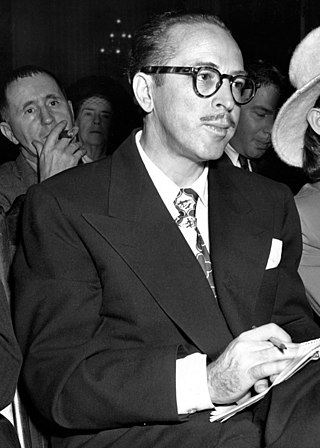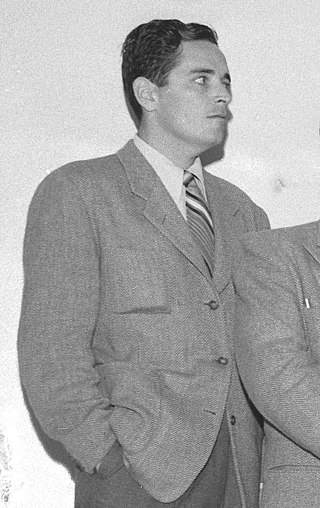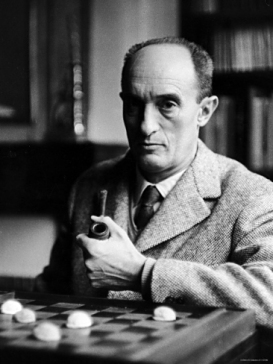Related Research Articles

James Dalton Trumbo was an American screenwriter who scripted many award-winning films, including Roman Holiday (1953), Exodus, Spartacus, and Thirty Seconds Over Tokyo (1944). One of the Hollywood Ten, he refused to testify before the House Un-American Activities Committee (HUAC) in 1947 during the committee's investigation of alleged Communist influences in the motion picture industry.

Joel Daniel Coen and Ethan Jesse Coen, collectively known as the Coen brothers, are American filmmakers. Their films span many genres and styles, which they frequently subvert or parody. Their most acclaimed works include Raising Arizona (1987), Miller's Crossing (1990), Barton Fink (1991), Fargo (1996), The Big Lebowski (1998), O Brother, Where Art Thou? (2000), No Country for Old Men (2007), True Grit (2010), Inside Llewyn Davis (2013), and The Ballad of Buster Scruggs (2018). Many of their films are distinctly American, often examining the culture of the American South and American West in both modern and historical contexts.

The Bridge on the River Kwai is a 1957 epic war film directed by David Lean and based on the 1952 novel written by Pierre Boulle. Although the film uses the historical setting of the construction of the Burma Railway in 1942–1943, the plot and characters of Boulle's novel and the screenplay are almost entirely fictional. The cast includes William Holden, Alec Guinness, Jack Hawkins, and Sessue Hayakawa.

The Academy Award for Best Adapted Screenplay is the Academy Award for the best screenplay adapted from previously established material. The most frequently adapted media are novels, but other adapted narrative formats include stage plays, musicals, short stories, TV series, and even other films and film characters. All sequels are also considered adaptations by this standard.

Roman Holiday is a 1953 American romantic comedy film directed and produced by William Wyler. It stars Audrey Hepburn as a princess out to see Rome on her own and Gregory Peck as a reporter. Hepburn won an Academy Award for Best Actress for her performance; the screenplay and costume design also won.

Ringgold Wilmer Lardner Jr. was an American screenwriter. A member of the "Hollywood Ten", he was blacklisted by the Hollywood film studios during the late 1940s and 1950s after his appearance as an "unfriendly" witness before the House Un-American Activities Committee (HUAC) leading to Lardner's being found guilty of contempt of Congress.

Pierre François Marie Louis Boulle was a French author. He is best known for two works, The Bridge over the River Kwai (1952) and Planet of the Apes (1963), that were both made into award-winning films.

A ghostwriter is hired to write literary or journalistic works, speeches, or other texts that are officially credited to another person as the author. Celebrities, executives, participants in timely news stories, and political leaders often hire ghostwriters to draft or edit autobiographies, memoirs, magazine articles, or other written material.

Donald Edwin Westlake was an American writer, with more than a hundred novels and non-fiction books to his credit. He specialized in crime fiction, especially comic capers, with an occasional foray into science fiction and other genres. Westlake created two professional criminal characters who each starred in a long-running series: the relentless, hardboiled Parker, and John Dortmunder, who featured in a more humorous series.
Michael Wilson was an American screenwriter.

Carl Foreman, CBE was an American screenwriter and film producer who wrote the award-winning films The Bridge on the River Kwai and High Noon, among others. He was one of the screenwriters who were blacklisted in Hollywood in the 1950s because of their suspected communist sympathy or membership in the Communist Party.

Walter Bernstein was an American screenwriter and film producer who was blacklisted by the Hollywood movie studios in the 1950s because of his views on communism. Some of his notable works included The Front (1976), Yanks (1979), and Little Miss Marker (1980). He was a recipient of Writers Guild of America Awards including the Ian McLellan Hunter award and the Evelyn F. Burkey award.
The 29th Academy Awards were held on March 27, 1957, to honor the films of 1956.

The 30th Academy Awards ceremony was held on March 26, 1958, to honor the best films of 1957.
Ian McLellan Hunter was an English screenwriter, best remembered for fronting for the blacklisted Dalton Trumbo as the credited writer of Roman Holiday in 1953. Hunter was himself later blacklisted.
Christopher Trumbo was an American television writer, screenwriter and playwright. Trumbo was considered an expert on the McCarthy-era Hollywood blacklist. His father, screenwriter Dalton Trumbo, was blacklisted by Hollywood for nearly a decade for refusing to testify to Congress, as one of a group known as The Hollywood Ten.
Joel and Ethan Coen, collectively referred to as the Coen brothers, are American filmmakers. Their films span many genres and styles, which they frequently subvert or parody. The brothers write, direct and produce their films jointly, and have edited almost all of them under the collective pseudonym Roderick Jaynes.

Trumbo is a 2015 American biographical drama film directed by Jay Roach and written by John McNamara. The film stars Bryan Cranston, Diane Lane, Helen Mirren, Louis C.K., Elle Fanning, John Goodman, Michael Stuhlbarg as Edward G. Robinson, Dean O'Gorman as Kirk Douglas, and David James Elliott as John Wayne. The film follows the life of Hollywood screenwriter Dalton Trumbo, and is based on the 1977 biography Dalton Trumbo by Bruce Alexander Cook.

The Cavern is a 1964 Italian-German-American war-drama film directed by Edgar G. Ulmer. This was his last film as a director. It was one of a number of war movies John Saxon made outside Hollywood.
References
- ↑ "OSCARS GO TO WRITERS FOR 'KWAI'", New York Times, March 16, 1985, http://select.nytimes.com/gst/abstract.html?res=F40F15F8345D0C758DDDAA0894DD484D81
- ↑ "6 Nonexistent People Who Were Nominated for Oscars". 24 January 2018.
- 1 2 "Acad honors Trumbo for 'Roman Holiday'" Variety, May 12, 1993, http://www.variety.com/article/VR106758.html?categoryid=13&cs=1
- ↑ Jada Yuan (January 22, 2008). "Roderick Jaynes, Imaginary Oscar Nominee for 'No Country'". New York . Retrieved 2008-07-11.
- 1 2 Associated Press via the Augusta Chronicle: http://chronicle.augusta.com/stories/021303/fea_adaptation.shtml
- ↑ "Oscar nom for Montreal 'Dallas Buyers Club' editor", Canadian Press in The Record , January 16, 2014.